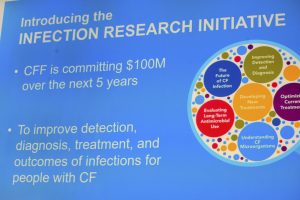#NACFC2018 — CFF Announces $100 Million ‘Infection Research Initiative’
Written by |

Anti-bacterial hand sanitizers at NACFC 2018.
The Cystic Fibrosis Foundation (CFF) will spend $100 million over the next five years to fund research aimed at fighting infections in patients with cystic fibrosis (CF) — a problem that seems destined to grow as patients live longer with the disease.
The announcement came during the 32nd Annual North American Cystic Fibrosis Conference (NACFC) now underway in Denver. Some 5,000 doctors, researchers, pharmaceutical executives, and others — about one-sixth the number of Americans with CF — are attending the meeting.
William Skach, MD, senior vice president of research affairs at CFF, said the newly established Infection Research Initiative will more than double the organization’s previous investment in this area over the past five years.
Speaking before a packed auditorium at the Colorado Convention Center, Skach said that CFTR modulators developed by Vertex Pharmaceuticals — such as Symdeko (tezacaftor/ivacaftor), Orkambi (lumacaftor/ivacaftor), and Kalydeco (ivacaftor) — are dramatically extending the life expectancy of CF patients in a way few could have dreamed of only 10 years ago.
“In the future, people with CF could live into their 80s if they go on modulators early in life. More and more of them will have completely healthy lungs, but we expect that a significant percentage of this population will still need additional therapy,” Skach said. “The greatest concern among CF patients remains the damage caused by chronic lung infections.”
Skach called the initiative “a comprehensive approach to improve outcomes associated with infections through enhanced detection, diagnosis, prevention and treatment.”
Lisa Saiman, MD, a professor of pediatrics at New York’s Columbia University Medical Center, said different microorganisms are problematic in different age groups — and that nontuberculous mycobacteria (NTM) infection, in particular, has been getting worse in recent years.
Such infections take a significant physical and mental toll on people with CF, and remain a top concern of both patients and clinicians. People with CF who have chronic infections are at greater risk for worsening lung disease and death. Many individuals also experience severe side effects from long-term antibiotic use, such as hearing loss, and face a higher risk of developing antibiotic-resistant infections.
“This initiative is incredibly important because it deals not only with understanding CF microorganisms better, but also looks at the therapies of tomorrow and how we’re going to deal with infections in the era of CFTR modulators,” Saiman said in a speech following Skach’s remarks.
Antibiotics losing their punch
Most CF patients develop complications from infections with bacteria, viruses, and fungi. Along with Pseudomonas aeruginosa bacteria — which affects 44.6 percent of the U.S. patient population — other problematic bacteria include Achromobacter (5.8% prevalence), Burkholderia cepacia (2.4%), and methicillin-resistant Staphylococcus aureus, or MRSA (25%).
In a phone interview prior to his announcement, Skach told Cystic Fibrosis News Today that infections have always been a major problem for people with CF — despite the routine, widespread use of antibiotics.
“That’s especially true for antibiotic-resistant infections,” he said. “Antibiotics are probably not as effective as they once were, and new bugs that are hard to treat are becoming more common. We decided it was really time to take this head-on and develop a program that holistically and comprehensively addresses the question. It also takes advantage of new technology available for detecting microorganisms and looking at outcomes of treatment.”
As such, the Infection Research Initiative aims to advance research into such microorganisms, including:
- Identifying new ways to detect microorganisms and diagnose infections.
- Enhancing understanding of CF microorganisms and how they are acquired.
- Supporting the development of safe and effective treatments, including antibiotics, antivirals, and antifungals.
- Optimizing current treatments to improve outcomes and minimize treatment burden.
- Evaluating the impact of long-term or frequent, intermittent antimicrobial use.
- Understanding how infections are influenced by disease-modifying treatments.
In 2017, the CFF — headquartered in Bethesda, Maryland — awarded $17.3 million in funding across more than 120 projects, including 10 discovery and development programs with industry.
CFF: 15-20 projects in pipeline
The new funding will go mainly toward understanding how microorganisms are acquired and how the body responds; developing new antibiotics with entirely new mechanisms of action, as well as repurposing existing antibiotics that could be used in different ways; and researching how to better use antibiotics and minimize treatment burden.
“This is big for people with CF, because so much of their time is spent treating infections,” said Skach, adding that the initiative — which does not involve Vertex — has 15 to 20 antimicrobial programs at various stages of development.
“I can’t go into specific programs, but they are with both small biotech firms and large pharma companies. Some are being funded and others are in negotiations,” he told Cystic Fibrosis News Today. “The majority are from companies who think they have a concept that might work. We bring in external advisers to evaluate the merits, and make a determination of whether to move forward.”
In most cases, he said, “companies have come to us, but we also approach companies who have projects we believe are of interest to CF.”
Skach said money for the $100 million initiative won’t be diverted from other CFF programs.
“This is new funding that’s being invested in the antibiotic and antimicrobial space. It’s being added to our existing programs,” he said. “Resources come from fundraising support as well as investments we’ve made that allow us to continue our mission. We’ll be looking at sinus infections, for sure, but it’s really the gastrointestinal microbial community we want to understand. This is definitely among the key initiatives.”
Asked if CFF will direct money to U.S.-based companies as well as foreign firms, he replied: “Both. We fund the best research, no matter where it is.”








